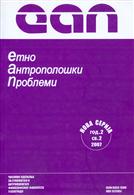Roditeljska kletva kao nevidljivo nasilje: diskurs antimaterinstva u tradicijskoj kulturi
Parental Curse as Invisible Violence: he Discourse of Anti-maternity in the Traditional Culture of the XIX Century
Author(s): Lidija RadulovićSubject(s): Anthropology, Gender Studies, 19th Century
Published by: Филозофски факултет, Универзитет у Београду
Keywords: parental; curse; maternity; anti-maternity; folk culture; gender theories;
Summary/Abstract: Curse is an appellative genre, a clichéd verbal proverb that is uttered in belief, that with the assistance of supernatural forces, God or demon, through the magical properties of words, evil will come upon an individual. It is examined through the context of the ideal motherhood discourse in the tradition culture of the XIX and the first half of the XX century, in view that it was perceived to be an idiosyncrasy of female demeanor. Maternity as a cultural construct in the traditional culture of Serbia is based upon the ideal motherhood discourses as a gift from god, as an innate role for women, an inherent instinct for caring towards others, as an unconditional motherly love. In practice, normative regulations and the concrete actions of a mother are not in complete concurrence, mothers love is not an objective fact, it can be present or not, vary in intensity, it can be selective, but it will depend on the personal history and cultural construct. Through such a focal point, motherly curse is perceived as a form of behavior that can be signified as anti-maternity. In the conceptualization of a parental curse, from one viewpoint, the manner of usual behavior of women that has no real implications on the life of the child is legitimized, and on the other hand, it is believed that a mothers curse has the most potent magical effect and is delivered up to the ninth generation. Parental curse and the ritual of "cursing" do not include a black magic connotation, and were considered a legitimate social mechanism through which evil was countered with evil i.e. the transgressor was being punished in cases where there existed no formal mechanism of punishment. Through such actions, the community, or family are re-imposing order in the social relations, synchronously sending a message that reaffirms the correct matrix of behavior and moral values of the community.
Journal: Етноантрополошки проблеми
- Issue Year: 2/2007
- Issue No: 2
- Page Range: 137-146
- Page Count: 10
- Language: Serbian

